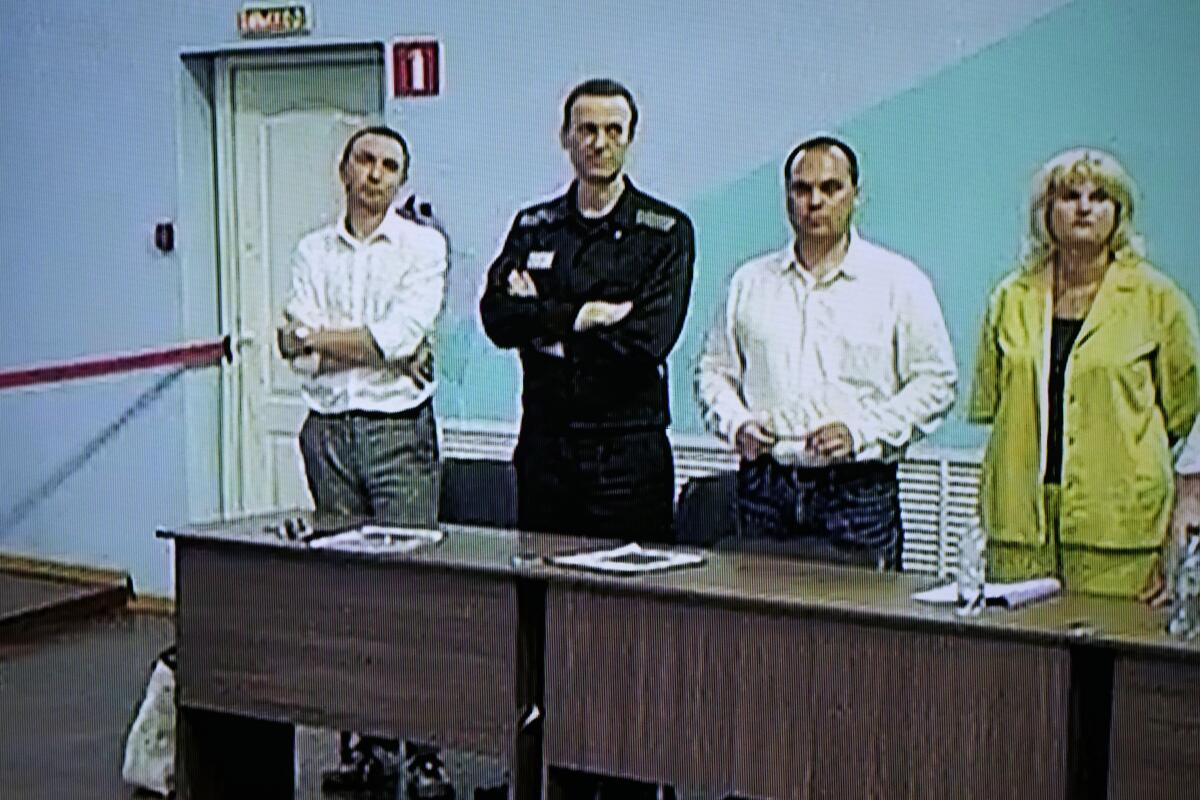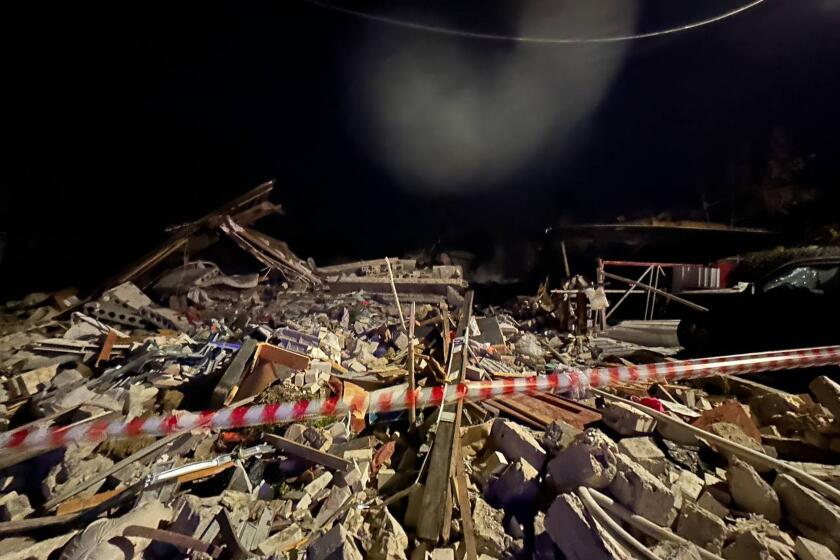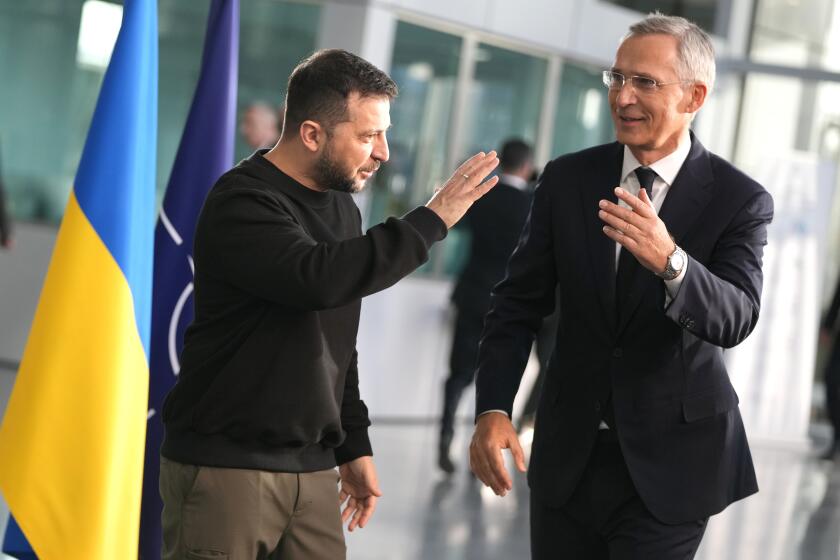Russia detains 3 lawyers for imprisoned opposition leader Alexei Navalny after raids

- Share via
TALLINN, Estonia — Russian authorities Friday detained three lawyers representing imprisoned opposition leader Alexei Navalny after searching their homes, the dissident politician’s allies said, a step that comes amid increasing pressure on the Kremlin’s critics.
The move was an attempt to “completely isolate Navalny,” his ally Ivan Zhdanov said on social media. Navalny, 47, has been behind bars since January 2021 on a 19-year prison sentence but has been able to get messages out regularly and keep up with the news.
The raids targeting Vadim Kobzev, Igor Sergunin and Alexei Liptser are part of a criminal case concerning charges of participating in an extremist group, Zhdanov said. All three were detained after the search, apparently as suspects in the case, Navalny’s team said on the Telegram messaging app.
Independent Russian media also reported a raid at a law firm that employs another of Navalny’s lawyers, Olga Mikhailova. According to reports, she is currently not in Russia.
Navalny, currently in Penal Colony No. 6 in the Vladimir region east of Moscow, is due to be transferred to a “special security” penal colony, a facility with the highest security level in the Russian penitentiary system, his spokeswoman Kira Yarmysh told the Associated Press.
“If he won’t have access to lawyers, he will end up in complete isolation, the kind no one can really even imagine,” she said.
Imprisoned Russian opposition leader Alexei Navalny learned from his lawyer that a film detailing his political activism won an Oscar.
If his lawyers end up in jail as well, Navalny will be deprived not only of legal representation but also of his “only connection” to the world outside of prison, Yarmysh said:
“Letters go through poorly and are being censored,” she said. With Navalny being held in a special punitive facility in the colony, he is not allowed any phone calls and hardly any visits from anyone but his lawyers, she said, “and now it means he will be deprived of this as well.”
For many political prisoners in Russia, regular visits from lawyers — especially in remote regions — are a lifeline that allows them to keep in touch with loved ones and supporters, as well as reporting and pushing back against abuse by prison officials.
Navalny is President Vladimir Putin’s fiercest foe, campaigning against official corruption and organizing major anti-Kremlin protests. His arrest in 2021 came upon his return to Moscow from Germany, where he recuperated from a nerve agent poisoning that he blamed on the Kremlin. He has since been handed three prison terms, most recently on the charges of extremism, and spent months in isolation facilities in the prison over various minor infractions prison officials accused him of.
As questions swirl over how Wagner boss Yevgeny Prigozhin’s plane crashed, many note that other Kremlin foes have met suspicious and violent ends.
Navalny’s Anti-Corruption Foundation and a vast network of regional offices were outlawed that same year as extremist groups, a step that exposed anyone involved with them to prosecution.
Navalny has previously rejected all the charges against him as politically motivated and accused the Kremlin of seeking to keep him behind bars for life.
Kobzev was due in court Friday, along with Navalny, for a hearing on two lawsuits the opposition leader had filed against the penal colony where he’s being held. Navalny said at the hearing, which was later adjourned until November, that the case against his lawyers is indicative “of the state of rule of law in Russia.”
“Just like in Soviet times, not only political activists are being prosecuted and turned into political prisoners, but their lawyers, too,” he said.
Romania found a crater near its border with Ukraine that authorities believe was likely caused by a crashed drone from Russia’s war on Ukraine.
Increasing isolation is something other political prisoners are facing as well. Last month, imprisoned opposition politician Vladimir Kara-Murza was transferred to a penal colony in Siberia and placed in a tiny “punishment cell,” his lawyers said.
Kara-Murza, 42, was convicted of treason for publicly denouncing Russia’s war in Ukraine and sentenced to 25 years in prison earlier this year. His social media posts are regularly updated with messages from behind bars, and his columns frequently appear in Western media.
But in a penal colony in the Siberian city of Omsk, Kara-Murza is “alone in a small cell, where there’s only a wash basin, a latrine, a chair and a table, and a bed that is strapped to the wall for the entire day,” his lawyer Maria Eismont wrote in a Facebook post last week.
“He is allowed to have only soap, toilet paper, a toothbrush and toothpaste, slippers, one book. Letters, a pen, paper and case files are given to him for only an hour and a half a day. There’s an hourlong walk in the prison yard, where he walks alone as well. The rest of the time he can sit on an uncomfortable chair or pace the cell,” Eismont wrote.
Ukrainian President Volodymyr Zelensky is making a personal pitch to NATO and other defense leaders from around the world for military aid for Kyiv.
Alexei Gorinov, a former member of a Moscow municipal council, is serving his sentence in similar conditions. Gorinov, 62, was convicted of “spreading false information” about the army in July 2022 over antiwar remarks made at a council session and sentenced to seven years in prison. He’s been in a punishment cell repeatedly since early September in IK-2, a penal colony in the Vladimir region.
Last week, Gorinov was transferred to a pretrial detention center in Vladimir after a new criminal probe was launched against him on charges of condoning terrorism, according to his Telegram page. The post didn’t clarify the accusations against Gorinov. In the detention center, he was once again placed in an unheated punishment cell and he will stay there until Oct. 25, the post said.
Andrei Pivovarov, another imprisoned high-profile opposition figure, has been in isolation since January. Pivovarov, 42, was sentenced to four years in prison on charges of engaging with an “undesirable” organization — a label slapped on the pro-democracy group he headed, Open Russia, shortly before his arrest.
Pivovarov is serving his sentence at IK-7 in the Karelia region of northern Russia and is being held in a “restricted housing unit” in a single cell, his wife, Tatyana Usmanova, told the Associated Press. She has only seen him once since his arrest in May 2021, and they were married in July and allowed a three-day visit.
Pivovarov is not allowed to have phone calls and gets only about two hours a day for writing letters, which go through prison censors to get mailed, so if not for the lawyers visiting him regularly, Usmanova says she would have “really long gaps between those letters during which I wouldn’t at all know whether he’s OK or not OK, healthy or not healthy, alive or not.”
More to Read
Sign up for Essential California
The most important California stories and recommendations in your inbox every morning.
You may occasionally receive promotional content from the Los Angeles Times.














